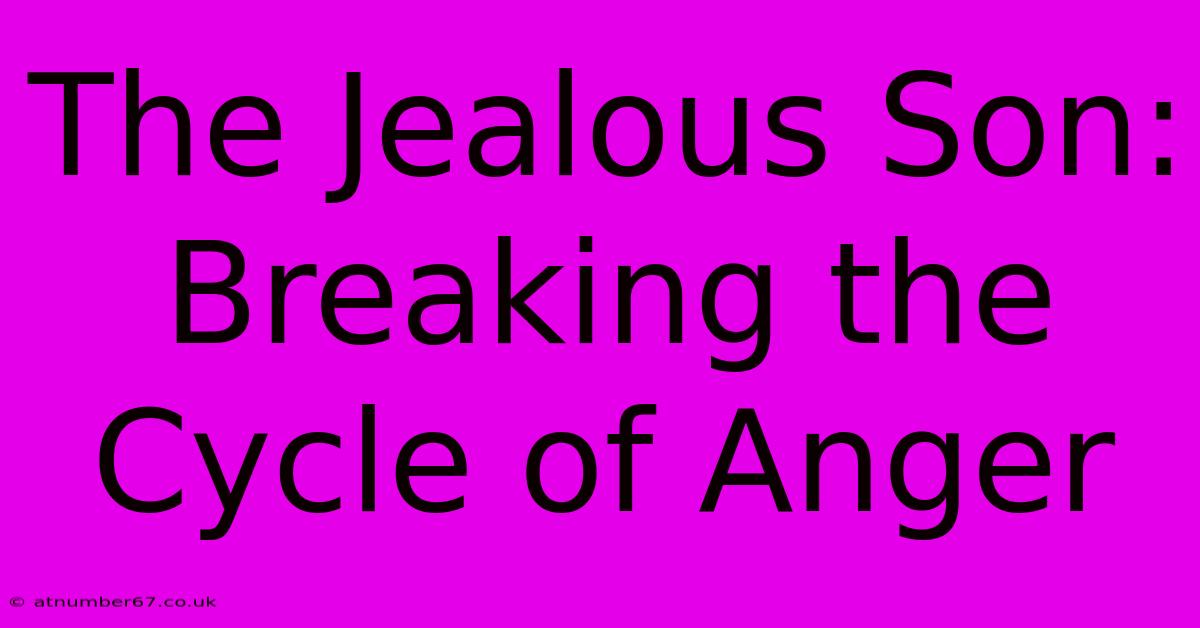The Jealous Son: Breaking The Cycle Of Anger

Table of Contents
The Jealous Son: Breaking the Cycle of Anger
Sibling rivalry. It's a timeless theme, woven into literature and folklore for centuries. But when that rivalry morphs into deep-seated jealousy, fueled by anger and resentment, it can have devastating consequences. This article explores the complex issue of a jealous son, examining the roots of this destructive emotion and offering practical steps toward healing and breaking the cycle.
Understanding the Roots of Jealousy in Sons
Jealousy in sons, unlike the often more overtly expressed anger of some daughters, can manifest subtly. It might be masked by sullenness, withdrawal, or even seemingly unrelated behavioral problems. Understanding the underlying causes is crucial for effective intervention. Several factors contribute to a son's jealousy:
1. Perceived Favoritism:
This is perhaps the most common trigger. A son might feel his brother or sister receives more attention, affection, or material possessions from parents. This perceived inequality, even if unfounded, can fester and breed resentment. The key here is perception, not necessarily reality.
2. Parental Comparisons:
Parents, often unknowingly, can fuel jealousy by directly comparing siblings. Statements like, "Why can't you be more like your brother?" are damaging and contribute to feelings of inadequacy and resentment. This constant comparison breeds an unhealthy competitive spirit.
3. Unmet Needs:
Underlying the jealousy may be unmet emotional needs. A son might crave more attention, validation, or understanding from his parents. Jealousy becomes a way to indirectly express these unmet needs. He may act out to gain attention, even if it's negative attention.
4. Developmental Stages:
Jealousy is particularly common during developmental stages marked by significant change or competition for parental resources, such as early childhood (toddler years to pre-school) and adolescence. Understanding these developmental milestones can offer context.
The Manifestations of Jealousy in Sons: Recognizing the Signs
Jealousy isn't always obvious. It can manifest in various ways, making it difficult to identify:
- Behavioral Problems: Acting out, defiance, aggression, and poor academic performance can be signs of underlying jealousy and resentment.
- Withdrawal and Isolation: A son might withdraw from family activities, becoming sullen and withdrawn, to avoid situations that highlight his perceived inferiority.
- Academic Struggles: Difficulty concentrating and poor school performance can be a way of expressing frustration and anger.
- Physical Symptoms: Anxiety, stomach aches, or headaches could be psychosomatic manifestations of the underlying emotional distress.
- Verbal Aggression: Openly criticizing or belittling siblings can signal intense jealousy.
Breaking the Cycle: Strategies for Healing
Healing from jealousy requires a multifaceted approach, involving both parents and the son:
1. Open Communication:
Creating a safe space for the son to express his feelings is paramount. Encourage open dialogue, actively listening without judgment. Avoid dismissing his feelings as "silly" or "unimportant."
2. Fair and Consistent Parenting:
While ensuring equitable treatment, parents should also recognize that equal doesn't always mean identical. Children have different needs and personalities. Focus on meeting each child's individual needs while maintaining fairness.
3. Positive Reinforcement:
Focus on the son's strengths and accomplishments, rather than dwelling on shortcomings. Positive reinforcement builds self-esteem and confidence, lessening the need for external validation.
4. Family Therapy:
Professional help can be invaluable. Family therapy provides a neutral space for addressing conflicts and developing healthier communication patterns within the family dynamic.
5. Addressing Unmet Needs:
Identifying and addressing underlying unmet needs is crucial. Spend quality one-on-one time with the son, engaging in activities he enjoys. Show him that he is valued and loved unconditionally.
6. Sibling Bonding Activities:
Encourage positive interactions between siblings. Plan activities that promote cooperation and teamwork, fostering a sense of camaraderie.
Remember: Breaking the cycle of anger and jealousy requires patience, persistence, and a commitment to fostering a healthy and supportive family environment. It's a journey, not a quick fix, and seeking professional support should be viewed as a strength, not a weakness. The goal is to cultivate an environment where every child feels loved, valued, and secure.

Thank you for visiting our website wich cover about The Jealous Son: Breaking The Cycle Of Anger. We hope the information provided has been useful to you. Feel free to contact us if you have any questions or need further assistance. See you next time and dont miss to bookmark.
Featured Posts
-
Mrs Lowry And Son A Story For Our Times
Apr 05, 2025
-
Mac Sinise A Sons Legacy
Apr 05, 2025
-
Mikey Madison Net Worth And Future Projects
Apr 05, 2025
-
Jennifer Lopezs Age A Guide To Effortless Elegance
Apr 05, 2025
-
Zahides Age On Tik Tok The Full Story
Apr 05, 2025
